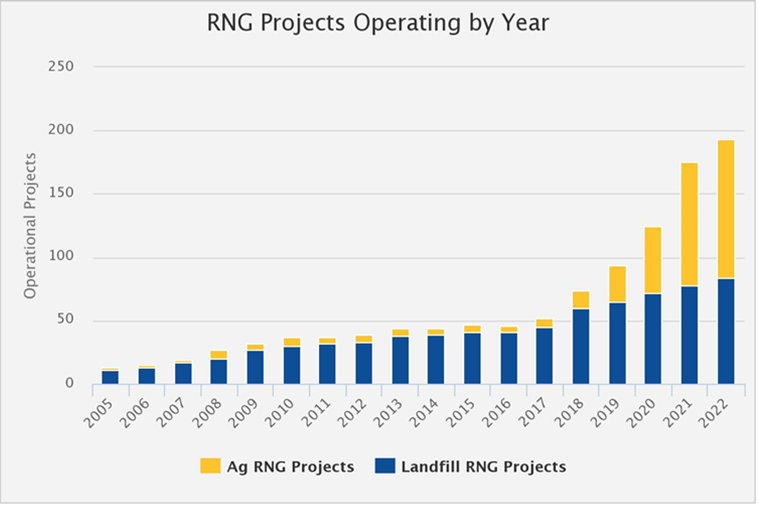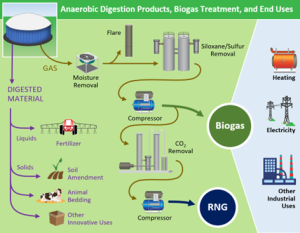Circular Economy – Waste to Renewable Natural Gas
Posted: August 2nd, 2023
Authors: Corey P.
The United States Environmental Protection Agency (U.S. EPA) uses renewable natural gas (RNG) as a term to describe the biogas that has been upgraded for use to replace fossil fuel natural gas. RNG can be produced from a variety of sources, including food waste, manure, and landfill gas, and can have significant impacts on the environment and local gas grid. A growing number of agriculture RNG projects are becoming operational, notably in the Northeast and Midwest portions of the United States, as well as in the state of California.

(Source: Renewable Natural Gas, Landfill and Agriculture RNG Projects in the United States (2005-2022), https://www.epa.gov/lmop/renewable-natural-gas)
Circular Economy
The Ellen McArthur Foundation describes circular economy as something to “tackle climate change and other global challenges like biodiversity loss, waste, and pollution, by decoupling economic activity from the consumption of finite resources.” This is based on three key principles of eliminating waste and pollution, circulating products and materials at their highest value, and regenerating nature.
Our current economic system often operates linearly, where a product is made, used, then discarded as waste. However, in a circular economy, the lifespan of resources is extended as waste is recovered and used again.
Many facilities across a multitude of industries are taking advantage of a circular economic system, by finding ways to recover waste, transform it, and use it as a raw material for the same or a different product. One example of this would be using waste byproducts to produce RNG.
Waste Disposal
Often, the disposal costs of municipal solid waste or shipment of liquid waste to a landfill or a wastewater treatment plant can be significantly more expensive than locally incorporating it in farms. A growing number of anaerobic digesters are being designed and constructed on and near farms around the United States. These digesters can process byproduct waste from sources such as commercial food waste, agricultural waste, or other organic waste, and through several processes, are converted to RNG.
What Is RNG?
RNG describes anaerobically generated biogas that has been upgraded (or refined) to use as a substitute for fossil fuel natural gas. RNG can be used for electricity production, vehicle fuel, or direct thermal applications (e.g., boilers, kilns, greenhouses, etc.). Additionally, the biogas used to produce the RNG can be obtained from a variety of sources, including (but not limited to) anaerobic digesters, livestock farms, municipal solid waste landfills, and organic waste management facilities.
(Source: Renewable Natural Gas, Diagrams of RNG Sources, Gas Treatment and End Uses, https://www.epa.gov/lmop/renewable-natural-gas)
With the digesters, the waste produces methane, which is captured and used in the production of RNG. Through additional treatment, moisture, carbon dioxide (CO2), and other hydrocarbons are removed, and through reducing pollution, avoids air quality degradation. Once treatment has occurred, it can be used at the facility where it was produced, or, upon meeting pipeline-quality standards, be injected back into the local natural gas grid. Due to the higher methane and lower CO2 concentrations and their respective global warming potentials (GWP) than the fossil fuel natural gas, greenhouse gas (GHG) emissions can also be reduced, in addition to other fossil fuel combustion emissions.
The U.S. EPA lists some of the potential benefits to a well-run RNG project as:
- Greater fuel diversity and availability – Biogas feedstock tends to generate more continuously and from a variety of sources, thus diversifying domestic energy production in cases of potential shortages.
- Positive local economic impacts – RNG typically leads to the more sales of vehicles powered by alternative fuel sources, generate more jobs per million diesel gallon equivalent at production facilities, and return the waste to local digesters rather than larger disposal facilities, which tend to cost more and not be locally-based.
- Local air quality improvements – Replacing old vehicles and old fuel sources in consumer facilities will reduce pollution, thus reducing air quality degradation.
- Reduced GHG emissions – Due to being less carbon-intensive and more methane-based, the overall GHG and CO2e emissions are reduced.
Permitting
There are several permitting processes for air, water, and solid waste media to keep in mind for RNG projects.
Air – digesters’ air emissions must be calculated and for the purpose of air permitting. Flares, boilers, gas upgraders, thermal oxidizers, generators and other emissions sources are used within the digestion process; therefore, an air permit for the digestor will likely be required by the state permitting authority. Additionally, the emissions associated with RNG combustion can be calculated, and may affect the facility-wide emissions across pollutants.
Water – Whether any liquid waste is treated onsite, discharged to a wastewater treatment plant, transported offsite, held in a local lagoon, or otherwise disposed of, the project will likely also involve a National Pollutant Discharge Elimination System (NPDES) water permit of some sort to regulate the discharges.
Waste – Due to the nature of the waste as the “raw material,” a waste permit (typically solid, non-hazardous waste) is required from the state agency. This will quantify the amount of waste being brought in and disposed of, the byproducts, and plans for waste storage, treatment, and disposal.
Environmental, Social, and Corporate Governance (ESG) – Stakeholders are becoming increasingly interested in facilities’ environmental footprint. It can be crucial to evaluate the potential environmental or social risks and benefits of a project, and any appropriate disclosures or quantifications stakeholders may require.
Next Steps
Interested in waste-to-energy projects for your industry? ALL4 can help support the permitting process across air, water, waste, for your project. We can also assist in quantifying and communicating ESG related benefits along with pursuing incentives for your project. If you would like to discuss your project or have any questions, please feel free to reach out to your ALL4 Project Manager or to Corey Prigent at cprigent@all4inc.com.


